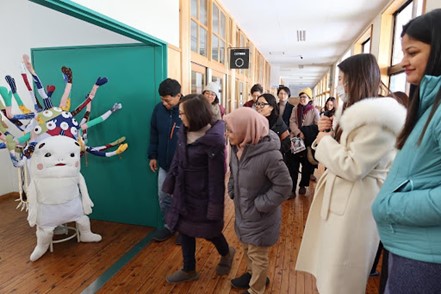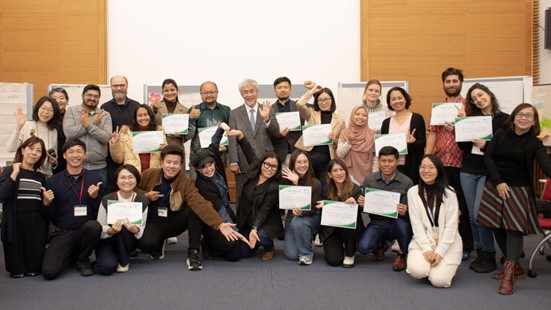January 21st, 2025
Topics
TERRA+ School FY 2024: Cultivating Transdisciplinary Research Capabilities
The 6th Transdisciplinarity for Early-career Researchers in Asia School (TERRA School) was hosted between 2 and 6 December 2024 at the Research Institute for Humanity and Nature, Kyoto. This intensive five-day program, organized this year in collaboration with RIHN’s newly established Uehiro Research Center for Japan Environmental Studies, brought together 19 early-career researchers from 13 countries of Asia and Europe.
Terra+ School is an intensive training program that offers participants the opportunity to explore TD principles, tools, and real-world applications. Taking benefit of a national research institute and the surrounding local community, Terra+ School encourages next-generation researchers to deepen their understanding of human-nature interactions and pressing sustainability challenges in Asia.
In recent years, Terra+ School has attracted an increasing number of applicants from outside the Asian region, and its name was updated to Terra+ to emphasize this expanded scope. To date, 99 early-career researchers across the globe have participated in the TERRA+ School. This year the program brought together a diverse cohort of participants from various disciplines, including the earth sciences, climate change, agriculture, political ecology, human geography, and indigenous knowledge. The group included researchers, engineers, artists, and lecturers, each of whom contributed their perspectives and expertise.
The course content was carefully designed to address three dimensions of transdisciplinary research: the foundational knowledge (“what to know”), the practical methodologies (“how to do”), and the reflective mindset (“how to be”). Through a dynamic combination of lectures, workshops, and interactive sessions, participants were introduced to the background and principles of TD, including systems thinking, power dynamics, trust-building, and participatory research. They engaged in activities that emphasized the importance of reflective exercises and fostering a collaborative mindset to enhance their effectiveness as transdisciplinary researchers.
Practical applications of transdisciplinary tools were demonstrated through case studies from current RIHN research projects. For instance, the Fair Frontiers Project highlighted methods such as actor mapping, photovoice, and participatory research. The SRIREP project illustrated the use of boundary objects, while participants actively engaged with a role-playing board game on water resource management developed by the LINKAGE Project. A workshop using Future Design encouraged participants to envision long-term scenarios.
Cultural insights enriched the program through a special session led by the Uehiro Japan Environmental Studies Center. Participants explored Japan’s Satoyama landscape and its cultural significance, learning about mountain faith practices from Yamabushi priests specially trained in Japanese ascetic Buddhism. These sessions offered a profound illustration of the interconnection between “self/humans” and “nature”.
A one-day field visit to Keihoku, a rural extension of Kyoto City, provided participants with a first-hand look at the sustainability challenges of rural Japan. The itinerary included visits to the Keihoku Fine Wood Production Cooperative, the Zero-Emission Satoyama SDGs House, and the Kyoto Satoyama biogas plant “MEGURU.” Participants also explored repurposed schools such as the Kyoto Satoyama SDGs Lab “KOTOS,” gaining inspiration from the innovative integration of sustainability principles into local practices. The field trip underscored the challenges faced by rural communities, such as aging populations and depopulation, while highlighting solutions aligned with the Sustainable Development Goals (SDGs).
The program also provided participants with valuable insights into funding opportunities through a session by the Asia-Pacific Network for Global Change Research (APN). This session outlined their Collaborative Regional Research Programme (CRRP) and Scientific Capacity Development Programme (CAPaBLE), equipping participants with knowledge to prepare competitive proposals.
Participants expressed high levels of satisfaction with the program, citing the well-structured content, engaging field visits, and opportunities for meaningful collaboration. Reflecting on the experience, one participant noted, “The course not only met but exceeded my expectations. It provided a rich and immersive learning experience, integrating theoretical depth with practical applications. The exploration of Kyoto’s Satoyama SDGs projects was particularly inspiring, illustrating how cultural values and sustainability practices align in profound ways.”
TERRA+ School FY 2024 demonstrated the potential for interdisciplinary research transformation and empowered the next generation of researchers with creativity, collaboration, and cultural sensitivity to address complex global issues.
You can read a participant's blog about TERRA School 2024 here and learn more about TERRA School here.
.jpg)




